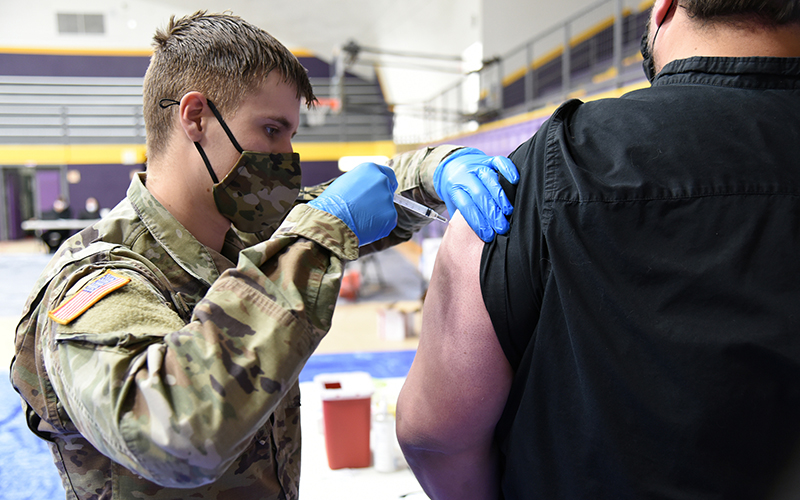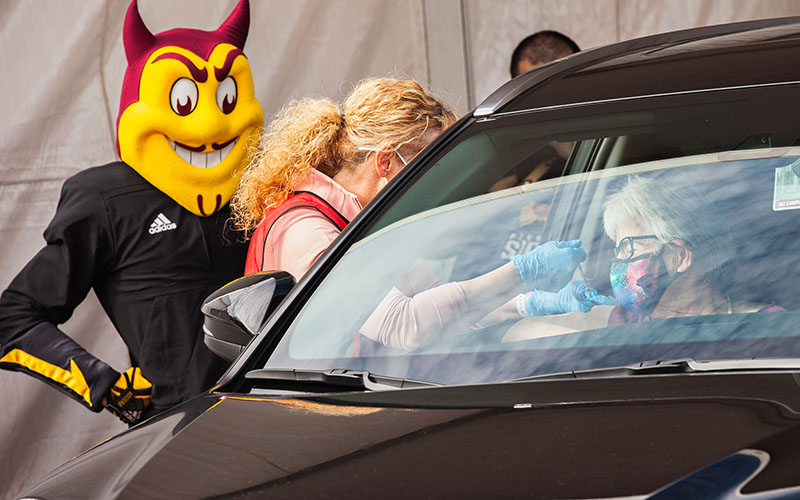WASHINGTON – Arizona delivered its 1 millionth COVID-19 vaccine Wednesday, a milestone that came just two months after the first doses were administered and “thrilled” state officials.
But the state still has a way to go: The 224,542 Arizonans who have received the two shots needed to be fully protected represent just 3% of the state population. And some experts worry that the 1 million doses that have gone out so far may not be reaching the people who need them most.
“These PODs are delivering vaccines to well-off Arizonans at the expense of low-income people,” said Will Humble, referring to the “points of delivery” set up around the state.
“Remember, low-income people have suffered the brunt of this virus from the start because they have jobs that put them in contact with the public a lot,” said Humble, the executive director of the Arizona Public Health Association.
The director of the Arizona Department of Health Services said this week that the state is trying to reach out to hardest-hit communities with vaccinations.
“We are looking to partner with community leaders to put community-based PODs in some of those hard-to-reach and targeted ZIP codes,” said Dr. Cara Christ, the department director. “But we definitely are trying to target those populations because we know how at risk they are.”
Her comments came during a virtual tour of the mass-vaccination site at State Farm Stadium Monday that Christ hosted for President Joe Biden and Vice President Kamala Harris. Both praised Arizona’s efforts at the 24/7 stadium site as a model for the rest of the nation.
That site, and a second mass vaccination site at Phoenix Municipal Stadium, had accounted for more than 200,000 doses as of Wednesday.
The racial breakdown of people who have received the vaccine in Arizona is hard to gauge based on numbers from AZDHS, since more than one-third of the 811,023 people who have been vaccinated – some more than once – are listed as “other race/unknown.”
Of those whose race or ethnicity is listed, however, almost half were white, a little shy of the 54.1% of the state that is non-Hispanic, according to the latest estimates from the U.S. Census Bureau. Just 8.2% of those vaccinated were identified as Latino or Hispanic, who make up 31.7% of the state. All other groups were all in the single digits, and all below their representation in the general state population.
One problem may be the system the state is using to schedule shots, said Dr. Georges C. Benjamin, the director of the American Public Health Association.
“For me, the biggest issue is there are enormous disparities we are still seeing in who got vaccinated and who didn’t get vaccinated,” Benjamin said Wednesday.
Benjamin notes that vaccinations are scheduled by computer: If someone works in front of a computer all day, they already have an advantage, he said.
“A person working in a grocery store, a person driving a bus, they can’t do that till they get home and that is usually after all the appointments are gone,” Benjamin said.

An Arizona National Guard soldier administers COVID-19 vaccine in Payson in this Jan. 4 file photo. The state this week passed the 1 million mark in vaccine doses administered, including second doses for more than 200,000 people. (Photo by Tech. Sgt. Michael Matkin,Arizona National Guard/Creative Commons)
And Humble noted that not everyone has easy access to the internet.
“Really, the only way into the system is through a computer, so you need to have a new computer, or at least a good computer,” Humble said. “You need broadband, you need Wi-Fi, and you need to have the information so you know precisely when the window of opportunity opens.”
COVID-19 cases in the state were nearing 800,000 as of Thursday, when the number of Arizonans killed by the disease totaled 14,662. State officials agree that much more needs to be done, but they also celebrated the 1 million milestone.
“We are thrilled to reach one million doses administered, and we will continue to get Arizonans vaccinated so we can protect our vulnerable populations,” Christ said in a prepared statement Wednesday.
Gov. Doug Ducey said in the same release that “there’s more work to be done.”
“Arizonans are eager to get the vaccine, and we’re committed to distributing it safely and efficiently,” he said. “We will continue to work with our private and public partners to quickly distribute the vaccine, and with the federal government to secure the doses we need to protect Arizona.”


